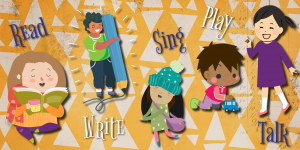
Most children enter the glorious “why?” stage between 2 and 4 years of age. During this time, your toddler will ask more questions than you ever thought possible! In fact, research has shown that children ask their parents roughly 228 questions per day! That’s a lot of questions!
Though this stage in your child’s life can be frustrating, it stems from a natural curiosity about the world around them. The best thing you can do is have conversations with your child. Children are more likely to repeat “why?” if they feel they have not received a “real” answer. They want to know all the answers – and they think that you have them!
So where do you start? It’s best to start at birth. Talking to your child from the moment they are born will give them the vocabulary they need as they grow older. Once your child can recognize these words in context, they’ll have an easier time understanding the world around them.
Here are some helpful tips to communicate with your child at every stage in their young life.
Babies
- Get down on your baby's level and observe where they are looking or pointing. Talk to your baby about what they see. At around 7 months, you baby will slowly start to recognize familiar words, such as names and common objects like “crib” or “bottle.”
- Sing to your baby! Even if you think you’re a terrible singer, your baby will think it’s the most beautiful sound in the world! Singing helps slow down speech so your baby can learn the common sounds in your language.
- Engage in back-and-forth exchanges! Once your baby starts making noise, talk back to them as if you’re having a conversation. This sets an example for how your baby can communicate.
Toddlers
- Extend your child’s language. For example, if your toddler says “shoe,” you can say “yes, we’re going to put the shoes on your feet so we can go to the store.” This will help give your toddler context for the words they know, and expand their vocabulary.
- Repeat what your toddler says, and then add a little more. For example, if your toddler says “I like that,” you can say “I like that giant blue ball, too!”
- Ask your toddler what they are doing. This will encourage your toddler to communicate, even if they have a limited vocabulary. If your child points to a toy in front of them, ask direct questions like “are you flying your blue airplane around the room?” This will expand their vocabulary.
Preschoolers
- Don’t be afraid to answer your child’s hard questions! If you don’t know the answers, have your child search for the answers with you. This will encourage them to find answers to their questions on their own.
- Ask your child to make predictions. When reading, watching TV, or doing fun activities, stop and ask your preschooler what they think will help next. This will start a conversation and teach them critical thinking skills.
- Connect your child’s learning to their own life. For example, if a book has pictures of a dog, ask your child to talk about their dog, or any other pets you have. This connects the concept to the context for the vocabulary, and helps your child learn how to have conversations.
Here is a list of fun picture books to encourage your child to talk!
Auntie Luce's Talking Paintings
-Kelli, Children's Librarian, Oro Valley Public Library
 Read, Write, Talk, Sing, Play!
Read, Write, Talk, Sing, Play!
The day children are born, their brains are primed for language. Talking with your child about anything and everything helps them build oral language skills, which are critical to early literacy!
Read more about early literacy and how you can make a difference in your child's life.

